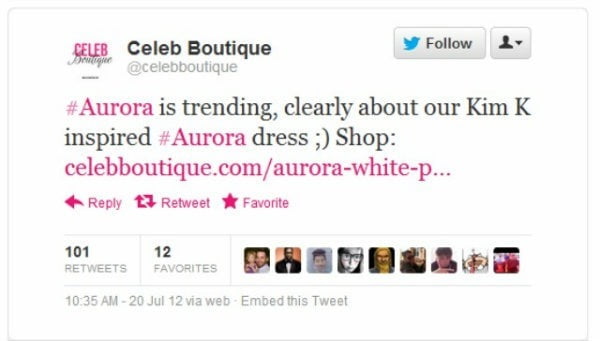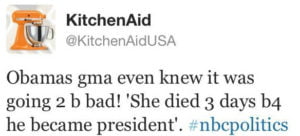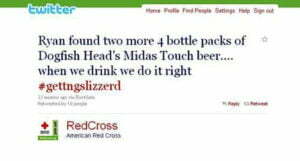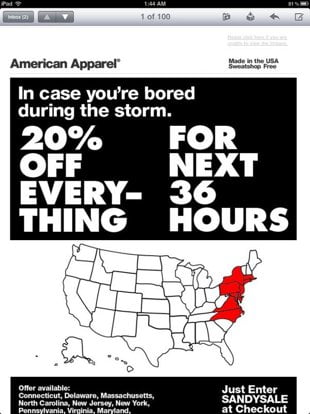For retailers, social media marketing can be an invaluable tool for creating brand awareness and reaching new customers. Social sites such as Facebook, Twitter, Pinterest and the like are an excellent way of creating a bond between a retailer and their market. The potential for any retailer to increase their business via social media marketing is great.
There’s a flip side to the awesome business enhancing the power of social media marketing however, and that flip side is its propensity to create disaster. As has been demonstrated time and again, when handled incorrectly, social media can do more harm than good. An ill-timed or poorly thought out tweet can reverberate throughout the internet for days, weeks, and months after it has been tweeted marring a retailers good reputation permanently. The consequences of something as simple as 140 characters gone wrong can have a lasting and negative impact on any retailer.
Many companies have fallen victim to a poorly received social media marketing decision. Fortunately, these blunders are things that we can all learn from. Here are some notable examples of social media marketing gone wrong, and how to avoid making these blunders yourself.
Hashtagging your tweets is a great way to make them more searchable on Twitter. It also makes it possible to participate in conversations already happening on Twitter. For inexperienced Tweeters, and sometimes even those who should have known better, hashtagging can cause a lot of problems.
Celeb Boutique (@celebboutique) is a fashion retailer which specializes in creating dresses based off of gowns which celebrities wear out in public and on the red carpet. In July of 2012, upon seeing that one of the trending topics on Twitter was “Aurora”, one marketing employee thought this was an excellent opportunity to promote a dress they make called Aurora which was based off of a dress worn by Kim Kardashian. They sent the following tweet:

The reason Aurora was indeed trending was because of the tragic movie theatre shooting which took place in Aurora Colorado. Celeb Boutique quickly found themselves under attack by Twitter users the world over.
Trending Topics are an excellent way to join conversations on Twitter. Before using a trending topic to promote your business, however, it is important to fully investigate why that topic is trending. It is in the best interest of retailers to avoid trending topics which involve expressing opinions on sensitive subjects in order to avoid alienating or offending your audience. Further, when a trending topic is of a sensitive nature such as #Aurora, expressing anything other than your condolences will be seen as inappropriate and offensive. A case of didn’t check or didn’t think, its hard to know, but it surely did not go over well for this retailer.
McDonald’s (@McDonalds) decided to promote a tweet asking their Twitter audience to share their McDonald’s stories with the hashtag #McDstories. The hashtag was meant to prompt Twitter users to share their positive stories about eating at a McDonald’s restaurant. The successful sharing of these stories had some unfortunate consequences for McDonald’s.
The #McDstories hashtag was quickly hijacked by users sharing stories of finding fingernail clippings in their meals, getting food poisoning, and other unsettling stories which ranged from gross to positively disgusting. McDonald’s reacted by removing their promoted tweets just two hours after starting the campaign. Even today, a quick Twitter search for #McDstories reveals that this hashtag is still alive and kicking within the Twitterverse. Remember, when you put it out there, it stays out there!
The lesson to be learned from McDonald’s is that what you put out on Twitter and other social media sites is completely out of your control once you’ve released it to the public at large. When conceiving of online marketing campaigns, it is important for retailers to consider the possible negative connotations of each campaign. Having a firm grasp on who your audience is will also help you avoid mistakes like the #McDstories campaign.
There are a number of really great platforms such as Hootsuite which combine all of your social media sites into one convenient dashboard making it that much easier to manage your company’s social networking sites from one place. With Hootsuite managing multiple Twitter or Facebook accounts is easy. However, with one simple slip up or mistake, the usefulness of Hootsuite can work against you as a tweet meant to be sent from a personal Twitter account may end up posted on a corporate Twitter account with damning consequences.
KitchenAid (@KitchenAidUSA) learned a valuable lesson about being diligent with posting when the following tweet went out to all of their followers:

What happened here was that the employee responsible for KitchenAid’s American Twitter account wanted to express their political views on their personal Twitter account. The employee made the mistake of tweeting to the KitchenAid account instead. The result was that a number of Twitter users who saw the offending tweet lashed out at KitchenAid forcing them to apologize to their followers. The damage, however, was already done. With great power comes great responsability! 🙂
American Red Cross (@RedCross) experienced the same sort of situation as KitchenAid when the person responsible for their Twitter account forgot to log out of the @RedCross account and into their own account. The following tweet went out to the Red Cross’ Twitter audience:

In response to this tweet, the Red Cross handled it like a pro. They followed it up with “We’ve deleted the rogue tweet but rest assured the Red Cross is sober and we’ve confiscated the keys”. This is an excellent example of a great way to handle an accidental tweet. If you screw up, own it and address it quickly!
Accidental tweets can happen to anyone. Fortunately, there are measures that can be put in place to prevent this from happening. Hootsuite offers Hootsuite Teams which is a feature of the popular social media tool that allows you to set restrictions on who can tweet directly to your social media accounts. For junior members of your online marketing team they can submit a tweet which then goes into a queue to be reviewed and approved by senior members of your online marketing team. By having systems such as Hootsuite Teams in place, incidences such as the KitchenAid tweet and Red Cross’ rogue tweet can be avoided.
While the Eastern Seaboard was scrambling to cope with Hurricane Sandy and a state of emergency had been declared for Connecticut, Delaware, Massachusetts, North Carolina, New Jersey, New York, Pennsylvania, Virginia, and Maryland, many retailers made the insensitive decision to capitalize on the misfortune of those caught in the storm. Many retailers launched sales, or sent out storm-themed email blasts.
American Apparel’s Sandy Sale: American Apparel was one of the offending brands to attempt to capitalize on Hurricane Sandy when they sent out the following e-newsletter:

Capitalizing on others misfortune… not cool!
American Apparel experienced considerable backlash for this campaign which offered a 20% discount for online orders. Users took to Twitter and Facebook to chastise the clothing retailer for their insensitivity.
Urban Outfitters’ This Storm Blows But Free Shipping Doesn’t: Urban Outfitters also partook in some online marketing meant to capitalize on Hurricane Sandy. They also sent out an e-newsletter:

There are ways to offer help that don’t rub in misfortune, this was not one of them
Offering free shipping on all orders, this campaign meant to make the retailer money included promoted tweets with the hashtag #Frankenstorm and a series of email blasts also themed around Frankenstorm. It was clear that a considerable amount of thought went into the marketing around Hurricane Sandy, however, not a single member of Urban Outfitters’ marketing team seemed to consider that their entire campaign might be in poor taste. To add to the insensitivity of this campaign, it was reported that Urban Outfitters’ own in-house blogger was affected by the storm and forced to take shelter from Hurricane Sandy. Being cruel to be kind does not work in social media!
Among the retailers who offered sales surrounding the disaster of Hurricane Sandy were The Gap, Costco, Old Navy, American Eagle Outfitters and J Crew. The backlash over retailer’s desire to capitalize on the worst storm to hit the East Coast in well over a century went so far as to include tweets from celebrities calling these retailers out on their insensitivity.
For retailers looking to avoid this mistake, the answer is simple. DO NOT make a joke of other people’s misfortune, and NEVER attempt to capitalize on ANY disaster or any event where people’s lives are, or can be, negatively impacted. While this should seem like a classic no-brainer, many marketing experts get it in their head that a joke can lighten the mood and win your favour online. Always remember though that this has proven to never be the case and that capitalizing on disaster via social sites is a bad move.
During the American Presidential election at the end of 2012, department store, Macy’s, found themselves under attack. The department store, which has a long history of being affiliated with Donald Trump, their spokesman, was pressured to sever all ties with Trump.
As part of a publicity stunt meant to hurt President Obama’s campaign, politically charged Trump offered up $5 million to anyone who could provide him with Obama’s college records and passport application. This, as well as a number of charity efforts Trump undertook in his support to Mitt Romney, did not sit well with democratic Macy’s shoppers who bombarded Macy’s Twitter and Facebook page with anti-Trump rhetoric. A number of online petitions went around as well asking Macy’s to cut all ties with Trump lest shoppers boycott Macy’s all together. Careful: By your friends you shall be known!
When it comes to choosing a public figure to represent your retail brand, it is important to remember what that person says or does will reflect upon you as a retailer. As your spokesperson, what they say or do will come back to haunt you if your audience doesn’t support, or is offended by, your spokesperson’s ideals. For the most part we feel it is advisable to avoid outing your retail brand as one with particular political allegiances, it is also advisable to avoid aligning yourself and your brand with controversial and politically charged individuals as well.
When it comes to marketing online, Guaranteed SEO can help retailers navigate their way through the potential confusion that is involved with social media marketing. Most of the blunders which retailers make online are preventable and the result of a lack of understanding of social media marketing.